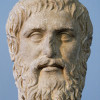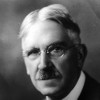“ The idealistic philosophy of Germany in the early nineteenth century endeavored again to equate the ideals of a free and complete development of cultured personality with social discipline and political subordination. ”
John Dewey, Democracy and Education (1916). copy citation
| Author | John Dewey |
|---|---|
| Source | Democracy and Education |
| Topic | personality philosophy |
| Date | 1916 |
| Language | English |
| Reference | |
| Note | |
| Weblink | http://www.gutenberg.org/files/852/852-h/852-h.htm |
Context
“The eighteenth century educational philosophy was highly individualistic in form, but this form was inspired by a noble and generous social ideal: that of a society organized to include humanity, and providing for the indefinite perfectibility of mankind. The idealistic philosophy of Germany in the early nineteenth century endeavored again to equate the ideals of a free and complete development of cultured personality with social discipline and political subordination. It made the national state an intermediary between the realization of private personality on one side and of humanity on the other. Consequently, it is equally possible to state its animating principle with equal truth either in the classic terms of "harmonious development of all the powers of personality" or in the more recent terminology of "social efficiency."”
source



